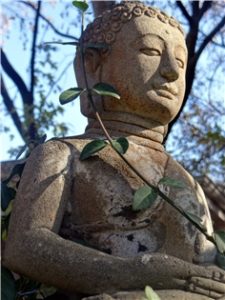Plague Journal, What The Buddha Said
Should I be a Buddhist? I ask the question from time to time. I have two statues of Buddha within the landscaping of our backyard. I am drawn to the physical statuary: a representation of a life Buddha lived, the Indian Prince who rejected the luxurious life which being well born would have afforded. The Prince of the Shakyas walked about the countryside a supplicant monk keeping company with himself in order to ascertain life’s essence. Over time he gathered a band of followers, drawn to his kind words, to his approach to the conundrum of “being human.” Did he achieve success on his inquiry? In the years that have passed, many in different places and cultures are convinced that he did, that his approach is productive to human fulfillment.
 Many things can be said of “Buddhism” as have been said of “Christianity”; neither tradition can or should be a doctrinaire system, a simulacra of the founders words. Much has changed in 21st century society by comparison to the 5th century BC India or to the backwater province of Judea under the reign of Caesar Augustus. Conversely human nature has changed little if at all. Meaning always arises from context, from the habits/practices of a community in a particular place and time.
Many things can be said of “Buddhism” as have been said of “Christianity”; neither tradition can or should be a doctrinaire system, a simulacra of the founders words. Much has changed in 21st century society by comparison to the 5th century BC India or to the backwater province of Judea under the reign of Caesar Augustus. Conversely human nature has changed little if at all. Meaning always arises from context, from the habits/practices of a community in a particular place and time.
To be Buddhist or Christian: be Buddha-like or Christ-like here and now.
The only option for understanding the teaching of Buddha or of Jesus is context, the conflicts of my own place and time: growing income disparity between the fortunate and the majority, global warming, palpable racism, etc. There is nothing magic, no supernatural advantage inscribed in words reputed to have been spoken by Jesus, or the Buddha. What matters is practice, trial and error effort to offer kindness to one’s self and to others. Like a basketball player shooting practice the free throws, — standing alone on the foul line, one shot after another.
Buddha said that these five considerations (facts) are useful, relieving the emotional attachments causing habits harmful to ourselves to others. The Five Remembrances are contained in the Subjects for Contemplation Discourse.
- I am of the nature to grow old. There is no way to escape growing old.
- I am of the nature to have ill health. There is no way to escape ill health.
- I am of the nature to die. There is no way to escape death.
- All that is dear to me and everyone I love are of the nature to change. There is no way to escape being separated from them.
- My actions are my only true belongings. I cannot escape the consequences of my actions. My actions are the ground upon which I stand.
Does it make a difference who said these words — if they are true?